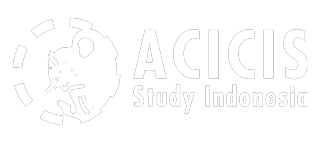Dianne O’Neill is a participant in the 2018 Creative Arts and Design Professional Practicum from Charles Darwin University. Dianne is studying a Bachelor of Creative Arts and Industries. Dianne received a $3,000 New Colombo Plan Mobility Grant to support her participation in this program.
Q: Why did you decide to undertake the ACICIS program?
I have a long-term interest in diverse cultures, and their arts, and believed the experience would enrich my own creative practice. Living in Darwin, Indonesia is closer than Australia’s southern cities, and there is increasing emphasis, in the arts community, on cross-cultural collaboration between the two countries. I will continue to learn Bahasa Indonesia, as the language will create new opportunities in Darwin’s creative arts scene, particularly in assisting visiting Indonesian artists. There is also a flourishing Indonesian community in Darwin, and I have a fondness for the friendly and gracious Indonesian people, who embrace diversity.
Q: How will the Professional Practicum benefit or influence your future career?
Increased confidence in diverse work -spaces, and a familiarity with Indonesian culture, creative arts and language have enriched me personally, and this will carry over into my own studio and creative work-shopping practices. The placement at Sekolah Gajahwong, with very little common language, has also reinforced my belief in art as a unifying and therapeutic means of communication. The experience is relevant to my humanitarian outlook on life. I would like to participate in cross-cultural collaborations with Indonesia in the future.
Q: What organisation are you interning with? (Explain your roles and responsibilities)
I have been interning with Sekolah Gajahwong as their first ACICIS student, thus roles and responsibilities were not set, but a process worked out with my mentor throughout the first week. My discipline is creative arts, not formal education, although this school functions less formally than mainstream schools. With one other person in the workplace with any English, and my Indonesian still very basic, I observed and participated in a class of 5 to 7-year-old children for the first week. The classroom experience was not unfamiliar to me as I spent several years tutoring young Aboriginal Australian children in primary schools.
Culturally, the first week was a rich experience. The school serves a marginalised community and receives negligible government funding. After familiarising myself with the school, I chose to involve the children in a project to paint the walls of their playground with a mural of their artwork. The people involved in this school all do so because they want to contribute something which will benefit this community, as do I.
Q: How have you found the work culture of your host organisation? How is it different to work experience in Australia?
The philosophy of this school is holistic, and based on the three R’s: reduce, reuse and recycle. The teaching has an agricultural (organic) bias and small farming, goat herding, and recycling are the main means of funding. This community is not officially recognised by local government, and therefore does not receive assistance from government programs for the poor. The staff, complemented by volunteers, are dedicated to helping their young students grow into loving, spiritual and environmentally aware community members. Although literacy and numeracy are important, creativity, innovation, love and acceptance of diverse peoples are the foundations of the education provided. Staff often stay beyond their working hours to help with fund raising (e.g. baking cookies).
Working on bare tiled floors, no desks, chairs, computers or internet, it is extremely different to schools in Australia, yet somehow richer and more wholesome. In Australia, I think we neglect the humane elements of education in favour of academic pursuit. We have all the material means which are so scarce here, yet these children are gently and constantly guided to communicate and express care for one another. I have not noticed any school bullies at my host organisation; in comparison bullying in Australia is significant and destructive. Ledhok Timoho Community regards itself as a large family and has managed to create and maintain a strong community apart from the mainstream. The community and school are widely known for their alternative methods and Utopian goals, very different to our Australian education system with its NAPLAN bias.
Q: What do you like to do in your spare time in Indonesia?
Learn about the history, talk to the locals, saturate myself with their creative arts, listen to live music, wander the streets, eat…anywhere and everywhere. Love the local cuisine, from street food and warungs, to restaurants, and never have any digestive problems. Drink kopi dan teh jahe. Now my placement has nearly finished, there is so much more to discover and learn, and I have barely explored Yogya. I would also love to travel to other parts of Indonesia but time is precious, and I also need down time. It is only in the last half of practicum I am feeling fully relaxed here.
Q: Would you like to return to work in Indonesia again in future?
Ya! Yes! Definitely! Most particularly to Yogyakarta. I have no great desire to return to Jakarta, but if an opportunity arose I would adapt.
Q: Favourite place to eat and favourite Indonesian food?
I have eaten Indonesian food at many different warungs and street carts and have rarely been disappointed. I can find them a second time but am not sure of names. I cannot name one favourite food: cap cai, gado-gado, soto ayam, kangkung, martabak, ikan goreng…all with sambal. For alternative, more westernised food in Yogy, Milas, Easy Goin’, and Mediterranean Restoran by Kamil all delight the taste-buds, but a favourite so far is Milas, for its food and its design.
Q: Favourite Indonesian word/phrase?
Jam karet.
Q: What places in Indonesia have you visited during your practicum so far?
Jakarta, Yogyakarta, Borobudur, Prambanan, Taman Sari, Jl. Malioboro, Salim Silver, Affandi Museum. The Sultan’s Palace and Ramayana ballet are my plans this week. I worked Saturday afternoons which restricted weekends away.


